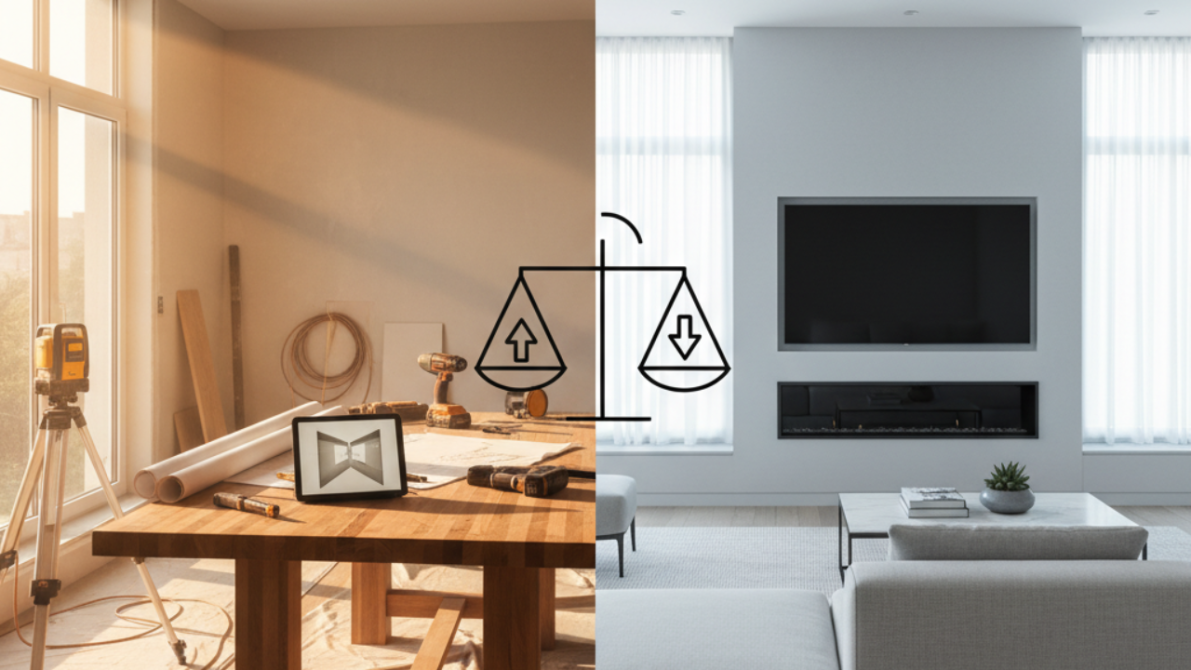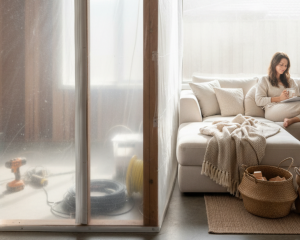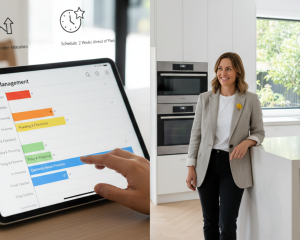Renovation vs Buying New: Comparing Costs & Savings in 2025
Key Takeaways
- Renovating your existing home can offer impressive returns on investment but brings risks, such as unforeseen expenses and potential delays, that require careful planning.
- Buying new provides certainty, latest amenities, and a short move-in timeline, but usually comes with a higher purchase price and less potential for immediate equity growth.
- The right choice renovation vs buying new depends on your financial situation, risk tolerance, lifestyle needs, and prevailing local real estate market conditions.
- Detailed cost analysis, trusted expert advice, and clear personal objectives are essential before deciding whether to renovate or move.
- Sourced from more than 20 years of real-world property investing experience and advice at www.propertychat.ai.
Should You Renovate or Move? Start Here.
Homeowners across Australia (and beyond) are asking the same question in 2025: How does the cost of renovating compare to buying a new property? The answer is critical—after all, your home is likely your biggest investment, and every dollar counts.
Within the first 100 words, it’s clear this isn’t just a numbers game. Whether you’re contemplating renovation vs buying new home, have calculated cost of renovating vs buying, or searched “is it cheaper to renovate or buy new?,” this guide will break down the dollars and sense. We draw on 20 years of seasoned insights from Propertychat.ai to make sure you get the complete picture—without the fluff, hype, or unreliable “hot tips” found elsewhere.
The “Hidden” Costs and Immediate Realities
When exploring the question “how does the cost of renovating compare to buying a new property?”, understanding upfront and hidden costs is crucial. Both options require significant investment, but the types and timing of expenses often differ.
When You Renovate
- Upfront Savings: Purchasing an older or outdated property below market value allows budget room for significant upgrades.
- Smart Upgrades: Cosmetic renovation (typically 8–10% of the purchase price) can drive impressive capital growth, sometimes delivering a dollar-for-dollar or even double return, as seen by experienced forum members on PropertyChat.
- Customisation: Renovation lets you control the finishes, layout, and overall vision—so you get a home tailored to your needs, not simply what’s available on the market.
- Financial Risks: Common renovation risks include unexpected issues like faulty wiring or concealed water damage, which can cause quotes to quickly escalate.
- Time Investment: Even well-managed renovations are disruptive, often taking months and impacting your daily routine. Consider whether you are willing to live through noise and dust.
When You Buy New
- Sticker Premium: New builds and turnkey homes carry a premium for their modern features. In tight post-pandemic property markets, this upfront premium is more pronounced.
- Low Maintenance: With everything new, maintenance demands are low—at least for the early years.
- No Surprises: What you see is what you get, reducing the risk of hidden repair costs.
- Instant Move-In: Immediate, stress-free occupancy is a top draw for busy professionals or families.
- Missed Equity Growth: When you pay top dollar for new, there’s often little room for instant equity gain—your price is already set by the market.
Comparing Dollar-for-Dollar: Which Strategy Works Best in 2025?
Choosing between renovation or buying new in 2025 means considering how each affects your wealth and lifestyle. Here’s a breakdown of real scenarios for property owners:
Scenario 1: Renovation for Value
Suppose you buy a sound-but-tired house for $850,000 and invest $85,000 (about 10%) on key upgrades: a modern kitchen, new bathrooms, and landscaping.
- Potential Result: With smart improvements and healthy market conditions, the property’s value may grow to $1,050,000 or higher.
- Wealth Effect: That’s $115,000 in equity growth, far exceeding your renovation spend.
- Risks: Cost blowouts, project delays, or a cooling market could reduce or eliminate your gains.
Scenario 2: Move to a Brand-New Home
A similar new property nearby sells for $1,100,000.
- Pros: Immediate comfort, a builder’s warranty, and no renovations.
- Cons: Higher mortgage repayments and you’ve bought at the top—instant equity is rare unless the market jumps.
- Equity Growth: Most future gains are tied to market trends, not value you’ve added.
What Does the Market Say About Home Renovation Costs in 2025?
Some key trends are reshaping the “cost of renovating vs buying” equation. According to insights from Propertychat.ai, overall home renovation costs have risen 15–20% since 2022 due to materials and labour shortages. Builders remain in high demand and project approvals take longer. However, strategic upgrades—especially kitchens, bathrooms, and open-plan living—continue to yield some of the best returns.
Tip: Add at least a 10% contingency to your renovation budget. Unforeseen costs are almost always an issue, no matter how prepared you are.
Beyond the Numbers: Personal Drivers That Shape Your Decision
While figures tell part of the story, your personal needs and lifestyle often drive the final decision.
Emotional Connection
- Renovating fosters a unique bond with your home—satisfaction in shaping it to your taste.
- Buying new is ideal for those who favour a move-in-ready, low-stress environment.
Lifestyle Fit
- Keen to live closer to the city? Renovation may be your only path into certain high-demand suburbs.
- Seeking peace of mind and less hassle? New builds offer certainty and an easy move.
Family & Future Plans
- If your family’s expanding or you expect elderly parents to move in, renovation allows perfectly tailored spaces.
- Planning to sell in a few years? Buying new provides easier resale and minimises risk of overcapitalising.
The Pros and Cons: Scannable Breakdown
| Renovating | Buying New | |
| Cost Upfront | Lower (can phase work) | Higher (one transaction) |
| ROI Potential | High (if smart upgrades) | Lower (value tied to market) |
| Customisation | Fully customisable | Set options, limited changes |
| Risk Level | Higher (budget blowouts) | Lower (predictable) |
| Convenience | Disruption, time required | Instant move-in, less stress |
| Long-Term Value | Can “leapfrog” price band | Slower, market-dependent gains |
Why Most Homeowners Get Stuck (And How to Break Through)
One of the biggest traps Australians face is paralysis by analysis. Many spend months or years mulling over “should I renovate or move?”—and never actually act.
Here’s how successful investors and homeowners move forward:
- Clarify Your Goals: Are you chasing capital growth, lifestyle improvements, or both?
- Account for All Costs: Don’t overlook stamp duty, legal fees, moving expenses, and hidden renovation extras.
- Review Risk Profile: Is your comfort zone okay with unpredictability or do you want certainty?
- Tap Into Community Knowledge: Trusted forums such as Propertychat.ai can save you costly mistakes through firsthand experience.
- Avoid Waiting for Perfect Timing: There’s no perfect market—only a perfect plan for your needs.
Real Stories: What PropertyChat’s Investors Have Learned
- “My $70k kitchen and bath refresh added $130k to my home’s value in three months. But I blew my landscaping budget through rookie mistakes—ask the forum before you hire!”
- “We bought new for peace of mind. Loved it, but six years on, resale gains were just average. My friend doubled her equity by renovating in a similar suburb. It’s about the buy-in price and vision.”
- “Missing out on the suburb I grew up in felt hard—until we bought the worst house on the best street, renovated, and moved up the ladder faster than our friends who bought move-in ready.”
Ready to Decide? Here’s Your Action Plan
- Write Down Non-Negotiables: Detail your lifestyle needs, budget, risk tolerance, and preferred timeframes.
- Research Comparables: Study both listed and recently renovated properties in your target areas.
- Join Community Discussions: Visit Propertychat.ai for collective wisdom from homeowners with decades of experience.
- Assemble Your Team: Identify a property-savvy mortgage broker, a reputable builder, and an agent who understands renovation value.
- Calculate Value Potential: Assess real-world resale data on recent renovations—don’t just guess.
- Take Action: Remember, practical steps trump endless research every time.
Conclusion: Which Should You Choose in 2025?
When considering “how does the cost of renovating compare to buying a new property?”, there is no one-size-fits-all answer. Renovating your home can unlock significant value and personal fulfilment—if you buy well, invest wisely, and manage your risk. Buying new is easier and offers a stress-free experience, but it comes at a price, and rapid equity gains are uncommon.
Regardless of your choice, don’t make the journey alone. Draw on the depth of knowledge, lessons, and proven examples at Propertychat.ai before making a big move. Your smartest decisions often start with learning from those who have done it before.
Ready to plan your next move?
Visit Propertychat.ai to connect with a thriving network of experienced homeowners and investors eager to share honest lessons—no sales pitch, just real-world support.
Related Articles and Resources
- Your Property Success: Renovation Insights
- PropertyChat: Renovation Forum
- How Much Does It Cost to Renovate a House?
- Pros and Cons of Property Investment in 2025
Ready to renovate with confidence?
Start your journey with the proven frameworks and expert support at Your Property Success and PropertyChat.ai.
Transcript
Renovate or Buy New? The $115,000 Decision Revealed
0:00All right, let’s jump right in. We’re
0:02tackling one of the biggest questions
0:03you can face as a homeowner, especially
0:05in 2025. Should you renovate the place
0:08you’re in or just buy something brand
0:09new? You know, this is a massive
0:11financial decision. So, we’re going to
0:12break down exactly how to make the
0:14smartest possible choice for you. So,
0:17let’s get straight to the heart of it.
0:19This isn’t just about a nicer kitchen or
0:21a bigger backyard. No, the real question
0:24we’re asking is which of these paths
0:26actually builds more wealth for you in
0:28the long run? because that that’s the
0:30real game, isn’t it? And look, the
0:33stakes here could not be higher. For
0:35most of us, our home is the single
0:37biggest investment we are ever going to
0:39make. So, getting this decision right,
0:41whether to renovate or buy is absolutely
0:43crucial for your financial future. Every
0:46single dollar really truly counts. Okay,
0:50first up, let’s talk about the money
0:51you’ll spend right out of the gate.
0:53We’re going to do a head-to-head on the
0:55initial investment and just as
0:57important, those hidden risks that can
0:59totally catch you by surprise. So, on
1:02one side, you’ve got renovating. The
1:04upfront cost is often lower, right? You
1:07can grab an older kind of dated property
1:09for less and then budget for the
1:11upgrades yourself. But then on the other
1:13side, you’ve got the new build, which
1:14comes with what you could call a sticker
1:16premium. You’re basically paying top
1:18dollar for all the modern features, the
1:20convenience, and well, that brand new
1:22shine. But here’s the big trade-off.
1:24Renovating, it comes with a much higher
1:27financial risk. I mean, you just never
1:28know when you’re going to knock down a
1:30wall and find faulty wiring or some
1:32hidden water damage that completely
1:34blows up your budget. A new build,
1:36though, it’s all about predictability.
1:38The price is the price. No nasty
1:39surprises lurking behind the drywall.
1:42And that risk with renovations, it’s a
1:44bigger deal now than ever. Get this.
1:47Since 2022, home renovation costs have
1:50jumped by a staggering 15 to 20%. Why?
1:54Well, it’s all because of shortages in
1:55both materials and skilled labor, which
1:58makes budgeting super super critical.
2:01So, here’s the most crucial piece of
2:03advice. If you’re going to renovate, you
2:06absolutely must have a buffer.
2:08Seriously, the experts, the seasoned
2:10homeowners, they all say the same thing.
2:12Add a minimum 10% contingency to your
2:15budget because trust me on this,
2:16unforeseen costs are pretty much a
2:19guarantee. All right, we’ve talked about
2:21what you’ll spend upfront, but now let’s
2:24get to what really matters for building
2:25wealth, the return on your investment.
2:28So, beyond that initial spend, where’s
2:30the real value hiding? Let’s paint a
2:33picture here. Imagine a classic
2:35renovation scenario. You buy a solid but
2:38kind of tired looking house in a great
2:40neighborhood for say $850,000.
2:44The bones are good. You know, it just
2:46needs some love. Now you make a smart
2:49investment of $85,000. That’s just 10%
2:52of what you paid. And you spend it on
2:54the things that really move the needle.
2:56A modern kitchen, updated bathrooms,
2:58maybe a little landscaping. You’re not
3:00going crazy. You’re being strategic. And
3:03here’s where the magic happens. This is
3:06the power of renovating. With those
3:08smart fixes, the property’s value could
3:10easily jump to over a million dollar.
3:12So, after all your costs, you’re left
3:14with $115,000
3:16in pure equity. That’s value that you
3:19created, and it blows your renovation
3:21spend right out of the water. Now, the
3:23story for a new build is totally
3:25different. You’re buying at the absolute
3:27peak of the market. So, you’re not
3:29really creating instant value yourself.
3:31You’re just banking on the whole
3:32neighborhood, the broader market to lift
3:34your investment over time. But of
3:36course, you and I both know this
3:38decision goes way beyond a spreadsheet.
3:40It’s about your life, your family, your
3:42sanity. So, let’s talk about the
3:44lifestyle factors, the stress, and well,
3:48the soul of the home. And what’s so
3:50fascinating is when you lay out the
3:52tradeoffs. Renovating gives you a lower
3:55upfront cost, huge ROI potential, and
3:58total customization, right? But it also
4:00comes with way more risk and disruption
4:02to your life. Buying new is pretty much
4:04the opposite. It’s super convenient.
4:06It’s low risk, but it costs more to get
4:09in. And it’s long-term value is more
4:11tied to what the market does. You know,
4:13there’s this perfect story from an
4:15experienced homeowner that just sums it
4:17all up. One person said they bought new
4:19for the peace of mind, but their friend,
4:21they took a risk, renovated in a similar
4:23area, and ended up doubling their
4:24equity. It just goes to show it all
4:26comes down to your priorities, your
4:28vision, and this is critical, the price
4:30you buy in at. And this is where you
4:33really got to be honest with yourself.
4:35What’s the real goal here? Is it to
4:37create a totally unique home that you’re
4:39emotionally connected to? Or is the
4:41absolute non-negotiable being in a
4:43certain school district where maybe an
4:45older home is your only way in? These
4:47personal things are often way more
4:49important than the numbers on a page.
4:51Okay, so we’ve looked at the costs, the
4:54potential returns, and the lifestyle
4:56factors. Now, it’s time to stop
4:58analyzing, and start acting. Here’s a
5:01clear framework to help you make your
5:02absolute smartest move. You know, the
5:05biggest trap any of us can fall into is
5:08what they call paralysis by analysis.
5:10You spend months, maybe even years,
5:12weighing all the options, but you never
5:15actually make a decision. Real success
5:18comes from breaking through that, from
5:20taking clear, informed steps forward.
5:24So, here’s your action plan. Step one,
5:26get super clear on your goals. Is this
5:28about wealth or is it about lifestyle?
5:30Step two, account for all the costs. I’m
5:32not just talking the Renault budget. I
5:34mean, things like stamp duty, legal
5:36fees, stuff that adds thousands to your
5:38total. Three, be honest about your risk
5:40profile. Can you actually sleep at night
5:42knowing your budget might blow out?
5:44Four, and this is a real pro tip, tap
5:46into what other people have learned.
5:48Forums like Property Chat.ai are
5:50absolute gold mines for learning from
5:51the real world wins and fails of others
5:54before you spend a single scent. Five,
5:56get your expert team together. And
5:58remember, your most important player
5:59might not be your builder, but a great
6:00mortgage broker who knows how to
6:02structure the financing. And finally,
6:04step six, take action. And speaking of
6:07learning from others, if you’re ready to
6:09start planning your next move, visiting
6:11a site like property chat.ai AI is a
6:13brilliant next step. It’s just a
6:15community of experienced homeowners
6:17sharing honest real world lessons.
6:19There’s no sales pitch, just genuine
6:21support from people who’ve been exactly
6:23where you are right now. So, let’s leave
6:25you with this final thought. Forget the
6:28numbers for just a second. Ask yourself
6:30this. What does your future home, the
6:32one that truly supports your life, your
6:34family, your goals, what does it
6:36actually look like? Answering that
6:39question might just give you all the
6:40clarity you need.
Frequently Asked Questions
Is it generally cheaper to renovate or buy a new home in 2025?
It often depends on your property’s current value, renovation scope, and the local market. Renovating usually costs less upfront, but hidden surprises are common. Buying new is more predictable but comes with a pricier tag.
What are the key financial risks of renovating instead of buying new?
Renovation risks include budget blowouts, unforeseen repairs, planning approval delays, and shifting market values. Always add a buffer for contingencies and seek community advice before starting.
Are there hidden costs involved when buying a new property?
Yes—include stamp duty, legal fees, moving expenses, and potential upgrades or finishes not provided in standard new home packages.
Where can I find reliable advice before deciding to renovate or buy new?
Start with Propertychat.ai for Australia’s leading peer-to-peer knowledge base on investing, mortgages, and renovation strategies. Learn from people who’ve made both choices and can share real-life advice.



